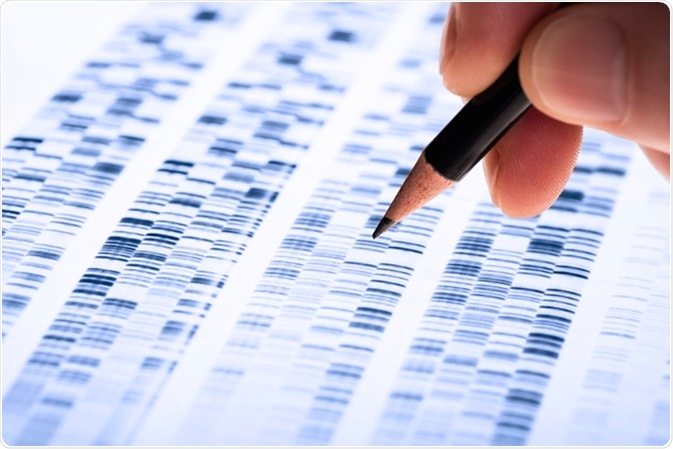Molecular cloning refers to the replication and recombination of DNA molecules. The first cloning experiments were carried out in the 1970s, when restriction endonucleases were discovered. Restriction endonucleases are enzymes that selectively cleave and cut DNA like a pair of scissors.

Scientist analyzes DNA gel used in genetics, forensics, drug discovery, biology and medicine. Image Credit: Gopixa / Shutterstock
These enzymes allowed scientists to cut out a specific piece of DNA, usually a gene, and paste it into a vector where it could be copied. In the process, changes can also be made to the cloned DNA segment. Cloning became a foundational molecular biology method, and is the basis for much of what is known today about genetics.
The basic process of cloning is the isolation of a DNA sequence from any species and insertion into a piece of carrier DNA, called a vector, for propagation inside a host species, which is usually bacteria or yeast. Those clones can then be used for genetic analysis, to produce protein, for mutation, and many other purposes.
The workflow of cloning has four steps:
- DNA is isolated
- Isolated DNA is inserted into a cloning vector
- Vectors are propagated in a host
- Hosts containing the DNA insert are selected
Gene Cloning with the School of Molecular Bioscience
Isolation of DNA
A cloning experiment begins by identifying the section of DNA that is being targeted for cloning. Often, this is a complete gene. The most common method to copy the gene is by polymerase chain reaction (PCR). PCR amplifies only the desired section of DNA.
How to set up a PCR
Once the DNA is amplified, the ends are prepared for ligation with restriction enzymes. Restriction enzymes are chosen for their compatibility with the desired vector. The amplified gene segment is then incubated with the restriction enzymes to cut the ends so there is an appropriate overhang for ligation.
At the same time, a vector is prepared to receive the DNA with the same overhanging ends.
The vector usually contains other genes that are useful for cloning, such as promoters and genes for antibiotic resistance that can be used for selection.
Ligation
During ligation, the amplified gene to be cloned is incubated with the vector. The ends of each have been prepared with restriction enzymes to have complementary overhanging pieces of single-stranded DNA. The nucleic acids on these overhanging sections pair with each other, and a ligase enzyme is used to close the gaps between nucleic acids.
Transformation
Once the DNA vector is prepared, it must be propagated in bacteria. The process of inducing the bacteria to take up the DNA vector is called transformation. Bacteria are usually prepared for transformation by treatment with calcium chloride.
The transformed bacteria are grown in culture. A method is required to select only those bacteria that have taken up and expressed the vector DNA. The most common method is through the use of a gene for antibiotic resistance, included in the vector. The growth media for the bacteria contains the antibiotic, so that the resulting cultures should only contain successfully transformed bacteria.
The first molecular cloning experiment was completed in 1973. The method has now become commonplace, and many innovations have been introduced to make molecular cloning faster, easier, more reliable, or customizable for specific types of genes and applications.
New cloning technologies have been invented, as well, that streamline the process into a single, one-tube reaction. Those include sequence and ligation independent cloning (SLIC), Gibson Assembly, Gateway Cloning, and more.
References
- Foundations of molecular cloning--past, present and future, https://www.neb.com/tools-and-resources/feature-articles/foundations-of-molecular-cloning-past-present-and-future
- Construction of biologically functional bacterial plasmids in vitro, https://www.ncbi.nlm.nih.gov/pubmed/4594039
- Molecular cloning: a laboratory manual, https://www.cshlpress.com/pdf/sample/2013/MC4/MC4FM.pdf
- Molecular biology of the cell 4th ed., https://www.ncbi.nlm.nih.gov/books/NBK21054/
Further Reading
Last Updated: Feb 26, 2019